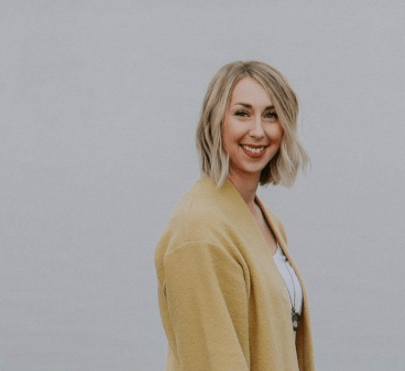Interview with Erin Nelson, Dietitian – Find Out Why All Foods Fit!
by Krishna Shah

Erin Nelson is a private practice dietitian and owner of Balance Nutrition Counselling. This interview goes over her career in nutrition, and her practice at Balance Nutrition Counselling. Keep reading to learn more about Erin’s journey and her words of wisdom about why she believes all foods fit.

On to the interview with Erin Nelson, RD:
What inspired you to want to become a Dietitian?
I’ve always had a love of food; most of my early childhood pictures are of me with some food in my hand. I first became interested in nutrition when I was pregnant with my daughter. The fact of way food worked in my body to help create a tiny human fascinated me!
When I moved to a small, remote, Arctic community, I discovered that food was more than nutrients in my body.
I was fortunate enough to learn about the Inuit culture by being gifted with traditional foods, listening to the Elders in the community, and sharing circles.
I also saw that the traditional Inuit food was rarely found in the local grocery stores and created a divide between living in town and traditional Inuit culture.
What did your education and career path look like?
Oh boy, where to start. My career path to get to this point has been…eclectic. Sometimes that’s how it has to be to find the right fit.
I began my post-secondary education at Marvel College, which has a private program for fashion design. Shortly after, Buffalo Jeans hired me as a Visual Trainer.
I then got a position as the Visitor Services Coordinator at the Royal Tyrrell Museum before moving to Nunavut and working as a substitute elementary school teacher and an office manager of a construction company.
When the University of Alberta accepted me into the Nutrition and Food Science program, my girls were 4 years old and 15 months old. It took me 5 years to complete my degree because I took 3-4 classes per term to keep my grades up while being a mother and wife.
In the middle of my degree, I was accepted into the Peter Lougheed Leadership College (PLLC), which gave me the skills necessary to become a leader who affects real and meaningful change.
I completed my degree with the Integrated Dietetic Internship; a one-year program in which the dietetic student is placed in community nutrition, clinical nutrition and foodservice management placements to learn about food and nutrition in practice.
Towards the end of my internship placements, I was hired by Alberta Health Services into the area of Chronic Disease Management as a casual dietitian.
Less than a year into my career, I had the opportunity to open my private practice. I decided that I could not pass up that opportunity!
What types of clients do you mostly see?
In my private practice, I see people for all kinds of reasons; general healthy eating, diabetes, intuitive eating, Crohn’s disease, Celiac disease, IBS, IBD, and disordered eating, with or without an eating disorder.
How do you deal with challenges at work?
I think I deal with challenges at work by asking lots and lots of questions.
If the challenge has to do with a clinical component, I often ask colleagues their opinion and turn to the nutrition practice guidelines or peer-reviewed literature.
If the challenge I am facing has to do with a client, I often find that asking them their expectations gives me a lot of information when making a plan together.
Sometimes my ideas of what is best for a client are not the same as theirs and that’s ok. It’s all about meeting the person where they are at and making goals with them, instead of for them.

Erin, what keeps you motivated?
Knowing I still have so much to learn! Dietetics is one of the most diverse professions out there. My career challenges me on a daily basis and I wouldn’t have it any other way.
I also love (love, love) building relationships with my clients as I watch them grow and learn from themselves (with some gentle nudging from me). I teach them about food and nutrition and oftentimes, I learn from them as well.
What traits do you think are important for all dietitians to have?
The ability to speak with people is huge! I know this sounds simple, but sometimes it isn’t.
As a dietitian, I have a piece of in-depth knowledge about how nutrients work within our bodies to keep us healthy and our body processes moving smoothly.
The hard part is translating that information into bite-size pieces that make sense to the people I see in a way that will be well-received and have the potential to create the most significant impact.
The capacity for self-reflection is also so important. As a dietitian, I need to be able to reflect on my own interactions with my clients and colleagues so that I can see what went well and what I could improve upon.
Self-reflection is also necessary to uncover any hidden biases that I may have in order to correct them.
What is the role of cultural competency in nutrition care?
I see so many culturally diverse people on a daily basis, being culturally competent is not negotiable. It becomes quite difficult to counsel a client when you are unsure of what their cultural practices are.
How do you deal with nutrition misinformation?
This is a good question. I try and deal with nutrition misinformation only when asked for my opinion on the topic. And then I try to give as objective an opinion as I can.
When nutrition misinformation comes out while seeing a client, I typically provide them with the latest evidence is showing. I inform them of any risks and then let them make the decision on their own.
Sometimes they choose to continue on the same path. And in this case, I typically help them to make safe goals and implement a plan. If they find the misinformation did not result in the desired outcomes, I will be there to help them make goals moving forward as well.
How do you stay up to date with nutrition information?
There are a few ways that I like to stay on top of the most up to date information. I attend webinars whenever possible and read the latest nutrition practice guidelines.
I also belong to Dietitians of Canada and have a PEN membership. It is a website that compiles all of the latest nutrition recommendations and its evidence.

Imagine you were holding a mic for 30 seconds and the entire world was listening to you. What would you say to them?
All foods fit. This is such an important mantra to live by to have a healthy relationship with food.
Food is so much more than nutrients to us. It brings us together, we celebrate over a meal, and foods remind us of our childhood, culture and traditions. It can be how we show care for others and how they show care for us.
Authors: Krishna Shah is a Dietitian Student at the University of Alberta and Erin Nelson, RD, owns her own business, Balance Nutrition Counselling.



